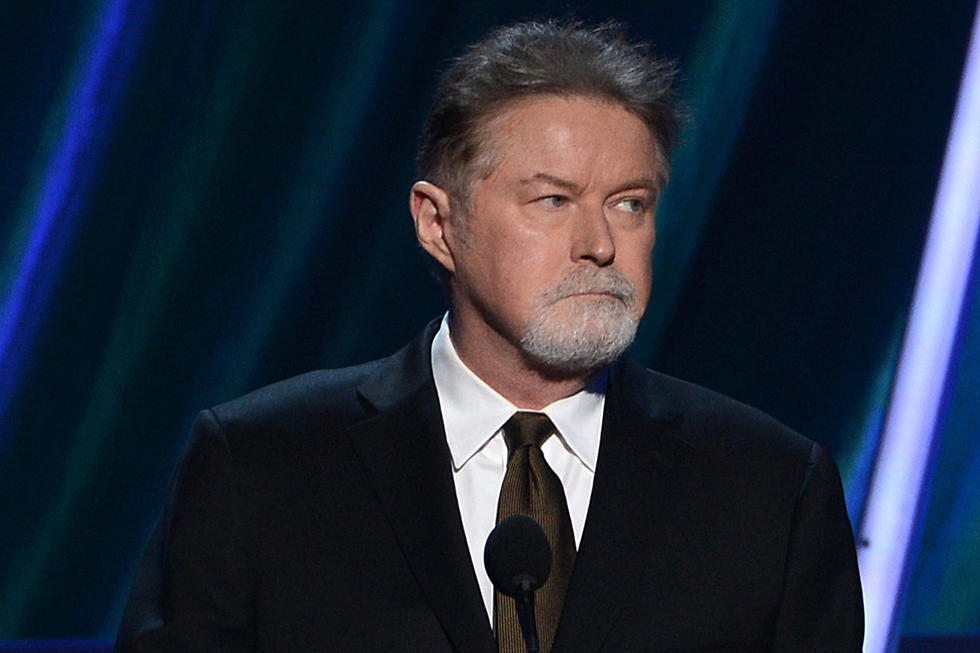25 Years Ago: Don Henley Releases ‘The End of the Innocence’
Don Henley didn't exactly shy away from including social commentary on his first two solo albums, but when it came time to record his third, 'The End of the Innocence,' his politics were much more prominent -- and the result was the biggest hit of his post-Eagles career.
Released June 27, 1989, 'The End of the Innocence' arrived in stores with the title track and first single already in heavy rotation. Co-written and co-produced by Bruce Hornsby, whose distinctive piano serves as the song's lead instrument, 'Innocence' offered fans an unabashed mission statement for an album that found Henley surveying '80s America and wondering what had happened to the idealistic promise of his generation's youth.
The record's heady themes might not have been the most Top 40-friendly stuff under normal circumstances, but 'The End of the Innocence' arrived at a portentous-seeming moment for Henley's fans -- as the wealth-obsessed, trickle-down '80s came to a close and glasnost bloomed in the Soviet Union, his fellow aging Cold War kids felt a distinct unease as they eyed the future, and no small amount of guilt as they ruminated over the past. But as strident as some of its lyrics could be, it felt like more of a searching statement than a jeremiad; Henley was clearly dissatisfied for much of 'Innocence,' but he was rarely didactic about it.
"I think there’s always a place for a little social commentary -- after all, that is one of the basic principles of rock, folk, blues and country music -- but you can’t hit people over the head with it," he pointed out in a 2013 interview. "You can comment, but you can’t preach."
The album ultimately ended up sending five singles to Billboard's Hot 100, but Henley claimed to be writing more for himself than anyone else. "I don't really think that much about what audience I'm trying to reach," he insisted. "Obviously, I hope that the music reaches a broad audience, but it hits whoever it hits. I just write about what concerns me. The environment has been my first concern for the past 25 years. Another big thorn in my side is the lack of personal accountability today. You can't find out who is responsible for anything anymore, and that feeling of helplessness has given rise to a lot of anger."
That anger had often informed his work, but as he entered his 40s, Henley admitted his perspective was changing. "I haven't slowed down, but I've gotten much better at coping with things. I'm still very angry about the world situation as I see it in government and as far as the way we are treating the planet, but I'm maybe mellowing a little more as far as love and romance are concerned," he allowed. "Except that I don't particularly like the word 'mellowing.' I would rather think that I'm maturing. I'm still angry and I'm still dissatisfied, but I'm not an 'angry young man' anymore."
A big part of that dissatisfaction stemmed from what Henley saw as an unraveling of the American social fabric -- a feeling that discerning listeners would find tucked into hit ballads like 'The Last Worthless Evening,' with its descriptions of suburban homes with shades drawn. "As I grow older, I see that people in general -- not just racists -- are becoming very wary of each other and separated," Henley told the New York Times. "We live in a time of great mistrust. The feeling that we are one as a nation is rapidly disappearing, and that carries over into people's private personal lives. I mention lawyers several times on the album. That's because of the pervasive sense of every man for himself and every woman for herself. These days you see more men and women suing each other. It's a very insidious thing."
As with his previous solo efforts, 'Innocence' found Henley working extensively with producer and session player Danny Kortchmar, who'd been a crucial part of his stable for 1984's 'Building the Perfect Beast' and 1982's 'I Can't Stand Still.' "I have the final say on what goes on my records, but Danny's the man. It's his baby," Henley told Modern Drummer. "He's got a little studio in his house, and he does a lot of work right there in his basement. The key is that I know how to conceptualize to him, and he knows how to read me. If I want to write a song with a certain style or about a certain subject, he knows what I'm talking about. We talk to each other sometimes by referencing old records or certain styles of records: Motown, the Philadelphia Sound, and Memphis. We talk in a language we both understand."
Also of extreme importance was the involvement of soon-to-be-former Heartbreakers drummer Stan Lynch, who received a special thanks in the liner notes because, as Henley bluntly pointed out, "he deserved it." "He's a real morale booster," he explained. "When we were into our second year working on the album and were getting completely batty and nuts, Stan would come down to the studio and just sit around with us sometimes and make things lighter. Stan's a very funny, very bright guy. Sometimes he assisted in production. Kootch and I would sometimes get so fatigued that Stan would catch things that we weren't exactly listening for. He was a fresh set of ears, a fresh sounding board."
Although he'd long since achieved household name status prior to this release, 'The End of the Innocence' kicked Henley's career into a higher gear, dominating the Top 40 airwaves for months and winning a Grammy on its way to more than six million copies sold. The question of an Eagles reunion never really went away no matter how many times he dismissed the idea, but by the time this album had run its course, Henley had unquestionably earned the right to be taken seriously as a solo artist on his own terms.
"What's encouraging to me is that as the years go by, time separates the men from the boys musically," he mused. "You've got these pop acts now where someone takes some pretty young boys or pretty young girls and actually manufactures a group, and some of them are successful, but only for a while. So the good stuff always manages to transcend the slings and arrows of time, and that makes me feel good."
He had plenty to feel good about after 'The End of the Innocence,' but that kind of success is always hard to follow; looking back, it's perhaps unsurprising that Henley ended up stepping away from his solo career during the '90s, reuniting with the Eagles early in the decade and taking 11 years to return with his next LP, 2000's 'Inside Job.' Then again, he didn't exactly need to rush anything in order to pay the bills, and he wasn't about to compromise his artistic ideals for the sake of another hit.
"People have labeled me a perfectionist -- I'm not a perfectionist, there's no such thing as perfection, especially in rock 'n' roll; rock 'n' roll is not supposed to be perfect. But I do strive for excellence, especially in the lyric department," he explained in a conversation with Mix Magazine. "I really try to give people something other than the pabulum that they get on the radio, which I think insults their intelligence. I make no apologies for striving. I set very high standards for myself. I don't always meet them, but I come close."
More From 1073 Popcrush










